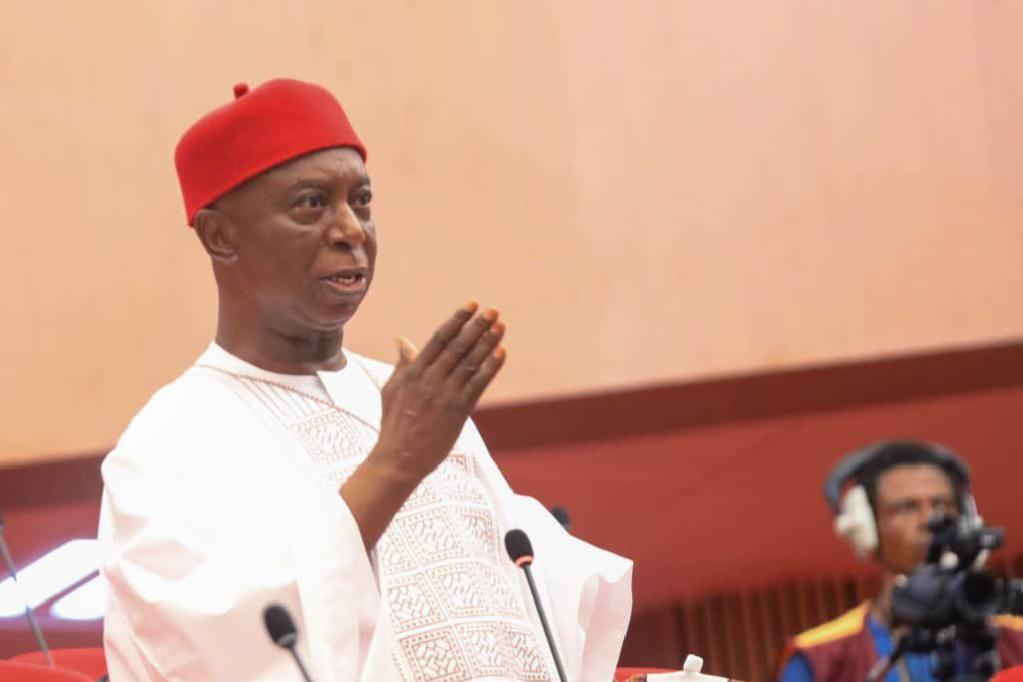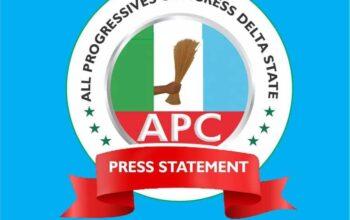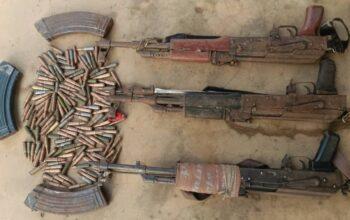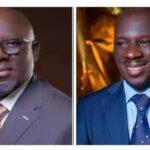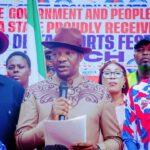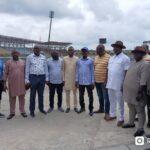Recently at the National Assembly and the 10th Senate of the Federal Republic of Nigeria, the member representing the Delta North Senatorial District in the person of Senator Ned Nwoko brought up a Bill seeking the creation of Anioma State out of the present Delta State. The State being proposed is envisaged to cover the territories of the nine Local Government Areas which constitute the District he represents currently in the upper chamber of the National Assembly. These are Aniocha North, Aniocha South, Ika North East, Ika South, Ndokwa East, Ndokwa West, Oshimili North, Oshimili South and Ukwuani Local Government Areas.
The territories of these nine LGAs were in colonial Nigeria, severally delineated into political constituencies that accorded primacy to Aboh and Asaba such that the two communities featured as seats of native authorities of the colonial administration with their respective districts, divisions and provincial governments. In his Bill that renewed the agitation for a separate State for the senatorial district he presents, the Senator recommended that the State being demanded should be included in the South East geopolitical zone of the country to bring the number of States in the zone to six, thereby squalling it up with what obtains in other zones in the country except the North West zone which currently has seven states.
While the activation of the decades old quest received the popular affirmation of the populace from diverse sections of the territory of the proposed State, the recommendation to have the State grouped among States in the South East geopolitical zone turned out a vexed issue to some persons and interest groups in the Delta North District. The sore points at issue in this recommendation as expressed by its most vocal antagonists are the claims that the people of Anioma tribes are, in all ramifications, better off in the South-South zone where they are presently grouped. This school of thought also claims that the tribes in the territory share closer cultural affinity and identity with other tribes in Delta State than with the Igbo speaking tribes in the South East geopolitical zone. Another shed of opinion opposing the recommendation has rejected it on the ground that the South East zone is a hotbed of violent agitation and thereby currently enmeshed in widespread insecurity, and by the estimation of this school of thought, leaving the peaceful South-South zone to join the violence and insecurity rocked South-East only speaks walking into nuisance.
Firstly; it should be acknowledged that the quest for an independent polity in the form of a separate State within a federation is a quest for self-determination. Therefore such a quest must flow from the common solidarity and consensus of the populace of the subunits that will constitute such a new State. This certainly provides room for diverse opinions which should coalesce into a consensus and a popular demand. However we must not be oblivious of the fact that in the enjoyment of this freedom and liberty of opinion and choice of sub-national unit, civility should be the utmost etiquette.
Moreover; it is indisputable that we are better off when we have popular participation in our public affairs, just as it is indubitable that decorum should be exercised especially in claiming the prerogative to speak for and on behalf of the generality of the people. In as much as the liberty of civil space confers on all citizens and their groups including socio-cultural organizations, the democratic right to ventilate their considered opinions on this and other contending issues as may arise, we ought to understand that there are bodies such as the gazetted traditional Councils of our LGAs and Town Unions that are recognized by law to represent the constituent communities of the State. In the end and in compliance with the standard of civilized democratic societies, the majority will have their way but the minority will have their say.
It is therefore on this score, the vituperative polemics and antagonism towards the ordinarily innocuous recommendation of the distinguished Senator should be seen to be misguided and a misfire, even as the reasons adduced by those opposed to the recommendation are historical and sociological fallacies.
Against the backdrop of the foregoing vexation, a cursory synopsis of how the prevailing identity crisis was engendered may suffice here. Nigeria as a nation-state and not the people (tribes and ethnic nationalities) comprising it is a creation of the British colonialists. The tribes and ethnic nationalities have existed and consolidated their intra and inter group relations prior to the voyages on the Niger by European explorers which paved the way for the commercial adventures of British traders and trading companies along the coast and the Delta of the River Niger which in turn, herald the emergence of Nigeria as a modern nation-state. During the period of the commercial adventure, the territory of paramount interest to the British merchants was the Niger coast extending from Lokoja and encompassing the Ase Creek, River Nun and the delta in Burutu and Focados from where the Niger empties into the Atlantic Ocean. This territory was carved out as the Lower Niger and Delta region in the commercial map of Nigeria drawn by the British mercantilists.
This foreign commercial interest in the area began around the 1830s and was spearheaded by Sir Turbman Golddie and his National African Company which was later renamed the Royal Niger Company. The trading activities were later extended to Brass, Bonny, Opopo, and the Old Calabar. The presence of these foreign merchants did not have a significant effect on group relations in these territories until the 1880s when the British Government joined other European powers for the scramble for colonial territories in Africa.
It was at this point that England began to adopt various strategies to secure a firm grip on the territories under the trade control of its nationals. This was with a view to deepen its imperial interest in West Africa. It was on that score, the Oil Rivers Protectorate was formalized in 1885 under a Consular Administration based in the Old calabar with a Vice Consul for the Consular Districts namely Opopo, Benin, Brass, Bonny and Farcados, The whole of this territory geographically lie in the bight of Biafra and Benin within the Gulf of Guinea. It was christened the Oil Rivers Protectorate by the British during the early phase of colonial rule. The territory covered by that colonial administrative unit (Oil Rivers Protectorate) is the present day South-South Region of modern Nigeria.
By 1900, the British went into their establishment of effective colonial authority over Nigeria with the hoisting of the Union jack flag at Lokoja. They took over and used as their spring board this colonial mission, the Trade Treaties which the Royal Niger Company had secured with the native political authorities. It was from this point that the colonial masters experimented with different strategies on the most cost effective way to administer the vast territory it had taken over as a British colonial territory. This marked the beginning of the destabilization of inter autochthonous/aboriginal relations in Nigeria.
The colonial masters finally settled for the indirect rule system because the system satisfied their overarching consideration of ease and cost effectiveness. With a focus on indirect rule, they searched for personages with paramount authority and who served as centres of great influence within the territories upon whom to build the native authority based system of administration. They also adopted already established trading posts as well as places with noticeable footprint of the Christian Missionaries especially the Church Missionary Society (CMS) as headquarters of the native administrations, and sometimes tried to create paramount rulers where they hitherto never existed. They also delineated administrative units using factors such as trade routes, waterways and missionary coverage areas etc.
The implication of the above is that the British utterly disregarded and disorganized the pre-existing affinities and the indigenous patterns of group relations among the tribes in the territory. For instance; until the British incursion, the Aboh Kingdom and the communities around the Ase Creek shared (and indeed still share) the identity of Ndi Oshimili sub-culture area of the wider Igbo ethnic nationality. The territory includes the communities of Aboh, Asaba Ase, Ossisa, Abala Clan, Azagba, Umuolu, Beneku, Onya, Akarai Clan, Utuoku and Okpai etc west of the Niger as well as Ossomala, Atani, Akili Clan, Odoekpe, Ogwu-Aniocha and Umunankwo etc on the east of the Niger.
The cultural affinity and group conscientiousness is till date, conspicuous from the axis of the Ase River to the east of the Niger encompassing Onitisha, obosi up to ugwute in Imo State and the Ndoni, Ogba and Egbema areas of Rivers State. During this era in our history, there was no difference both in linguistic and wider cultural identity between Aniocha/Oshimili (Enuani) people and Onitisha/Obosi and Ogidi. Not until 1931, when it was moved to the Benin Province, Asaba Division was a part of Onitsha Province. Of course in April, 1927 when the Revenue Ordinance was amended to make it applicable to the Southern Protectorate for the purpose of levying direct taxation, Warri Province was listed in the amendment as belonging to Provinces in the South East.
Just as with the Enuani and the Onitsha, the Ndokwa/Ukwuani communities from Umutu/Obiaruku to kwale (utagba), Emu Clan, Amai etc have socio-culturally been in sync with the Isoko people of Ozoro, Oleh and Owhe etc so also has the communities of the Ase Creek and the western Ijaw areas of Patani and its environ been with the other Isoko communities of Igbide, Enhwe, Uzere, and Erohwa etc. At the west-end of Anioma territory; the Ika speaking communities of Agbor Clan, Oza and Abavo sharing boundary with Orhionmwon Local Government of Edo state, tilted more towards Benin during this era.
The scope of this article can certainly not permit a more detailed coverage of this topic. However, the little exposition made here would shed light on why in a letter dated June 15, 1992 and submitted to the Gen. Ibrahim Babangida led Federal Military Government, the signatories requested that Anioma State be created out of Delta State with Onitsha and Atani environs (Onitsha and Ogbaru LGAs) be excised from Anambra State and added to Anioma State. The signatories to that letter were H.E. Dr. Nnamdi Azikiwe, Chief Denis Osadebe, Prof. Ben Nwabueze, Chief Anthony Modebe, Prof. B.I.C. Ijeoma Chief Philip Asiodu and Dr. Ukpabi Asika.
It is therefore worthy of note that contrary to the assertion of those who oppose Senator Nwoko’s recommendation, the different tribes within the Delta North Senatorial District have never maintained the same level of socio-cultural identity marking with all the other tribes in the two other Senatorial Districts of Delta State.
As much as those opposed to Senator are at liberty to speak up on their choice, they should refrain from the use of threat and pejorative expressions in doing so. They should as well desist from distorting incontrovertible facts of history in a bid to plead a case with a grossly erroneous premise and which exists only in their own imagination. Nevertheless; we must not fail to acknowledge and give credit to all the tribes in Delta State for the modus vivendi, by which they have managed and sustained the new group relations in the State thrown up by the balkanization of Nigeria.
Concerning the prevailing insecurity in the South East geopolitical zone of the country as a ground for opposing Senator Ned Nwoko’s recommendation, the ground is at best, factitious and gratuitous, a meretricious perspective to a riveting conversation and pure sentimental outburst driven by ethnocentric prejudice and outright xenophobia.
During Nigeria’s first and second republics, the South West was tagged the ‘Wild West’ due to the region’s reputation for political violence. In the 90s, the region was engulfed in violent ethnic nationalism by the Odua People’s Congress (OPC) but these notwithstanding, the Yoruba speaking people in Kwara State as well as the Iyagba/Kaba Yoruba in Kogi State who are currently grouped in the North Central zone have not only remain resolute in their agitation for a separate State to be create for them but have kept to their stand that the State being demanded should be made a part of the South West geopolitical zone. In the same vein, none of the Kanuri, Hausa, Jukun nor any other linguistic groups in either the North East or North West geopolitical zones has denounced their current regional group identity on the grounds of the insurgency and banditry seen as being perpetrated in both zones by mostly elements of Fulani extraction.
Moreover; there is clear no evidence of how leaving the South-South geopolitical grouping will hurt the Anioma tribes or the danger to which they will be exposed in the South East. Repudiation of the entire South East people because of the activities of the proscribed Indigenous People of Biafra’s (IPOB) agitation is tantamount to throwing the baby away with birth water. This is because not all the populace of the geopolitical zone subscribe to or support IPOB. Let it not also be forgotten that in the unfortunate Biafra—Nigerian War, many people of Southern Nigerian tribes/extraction found themselves at either side of the war not on their own volition. Many of them were merely caught up in the cross fire and therefore had no option than to fight their way to safety.
Most importantly; all Anioma people (as all the Igbo speaking tribes west of the Niger are now called) should wake up to the reality that denial of their Igbo identity is an effort in fertility. All over the world, language stands out as the strongest identity marker and it is never fettered by geographical barriers. Fulani is Fulani from the Futo Jelon to the sahal and same is Hausa throughout the ancient trans-sahara trade route. The French people are French by language so also are the Dutch etc. No matter how vehement the denial, the rest of the world identifies all Anioma people as Igbo.
So while embracing our Igbo identity, we can justifiably disassociate ourselves from IPOB and its Biafra agitation. This is because merely being Igbo does not make anyone Biafra. Contrary to the impression created by Gowon’s regime, the fact remains that at first, Biafra was never embraced by all sections of the Igbo population. They were only awoken to the reality that they had a well-orchestrated genocide to contend with and they had nowhere else to seek refuge. History will forever bear witness to this fact.
It is therefore imperative to appeal to the opponents of the recommendation made by Senator Ned Nwoko in the Bill seeking the creation of Anioma State to drop their Igbo-phobia, sheath their sword and join their compatriots to focus on the substance of the Bill in contention and not its shadow. If Anioma State is created today, be it left in the South-South or moved to the South-East, it will become the sixth State of Igbo speaking people of Nigeria.
I come in peace.
Bonny Akaeze, a Public Affairs Analyst writes from Asaba, Delta State.


